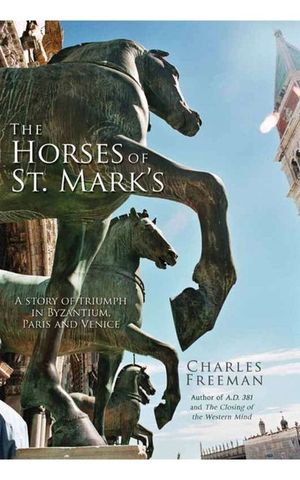The Horses of St. Mark's
Published by ABRAMS, Inc.
The noted historian explores the mysterious origins and surprising adventures of four iconic bronze statues as they appear and reappear through the ages.
In July 1798, a triumphant procession made its way through the streets of Paris. Echoing the parades of Roman emperors many years before, Napoleon Bonaparte was proudly displaying the spoils of his recent military adventures. There were animals—caged lions and dromedaries—as well as tropical plants. Among the works of art on show, one stood out: four horses of gilded metal, taken by Napoleon from their home in Venice.
The Horses of St Mark's have found themselves at the heart of European history time and time again: in Constantinople, at both its founding and sacking in the Fourth Crusade; in Venice, at both the height of its greatness and fall in 1797; in the Paris of Napoleon, and the revolutions of 1848; and back in Venice, the most romantic city in the world.
Charles Freeman offers a fascinating account of both the statues themselves and the societies through which they have travelled and been displayed. As European society has developed from antiquity to the present day, these four horses have stood and watched impassively. This is the story of their—and our—times.
In July 1798, a triumphant procession made its way through the streets of Paris. Echoing the parades of Roman emperors many years before, Napoleon Bonaparte was proudly displaying the spoils of his recent military adventures. There were animals—caged lions and dromedaries—as well as tropical plants. Among the works of art on show, one stood out: four horses of gilded metal, taken by Napoleon from their home in Venice.
The Horses of St Mark's have found themselves at the heart of European history time and time again: in Constantinople, at both its founding and sacking in the Fourth Crusade; in Venice, at both the height of its greatness and fall in 1797; in the Paris of Napoleon, and the revolutions of 1848; and back in Venice, the most romantic city in the world.
Charles Freeman offers a fascinating account of both the statues themselves and the societies through which they have travelled and been displayed. As European society has developed from antiquity to the present day, these four horses have stood and watched impassively. This is the story of their—and our—times.
BUY NOW FROM
COMMUNITY REVIEWS

